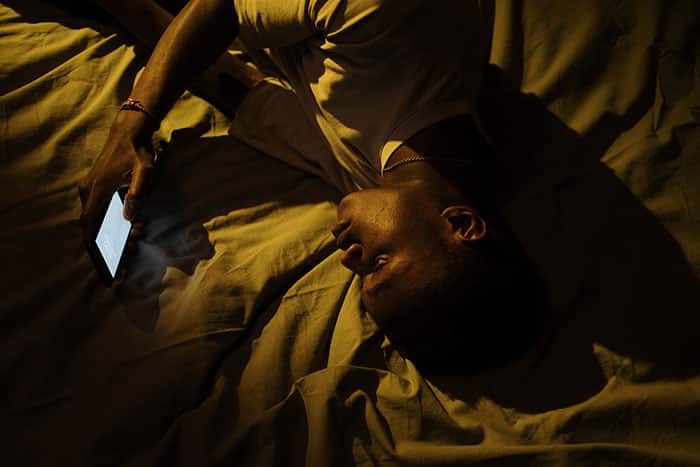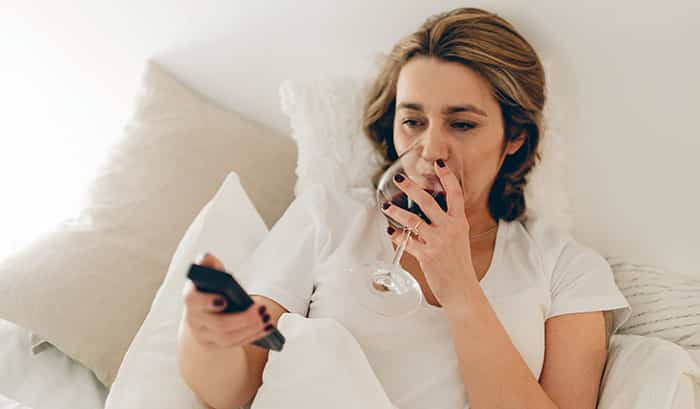Sleep is essential for good health. Getting a restful night’s sleep is, however, elusive for many. The National Heart, Lung, and Blood Institute estimates that between 50 to 70 million Americans have a chronic sleep disorder.

This inability to sleep well at night can have serious long-term consequences for both health and mental well-being. There are, fortunately, things that people can do to not only fall asleep but get the restorative rest that they need.
What Kind of Sleep Problems Can People Have?
The inability to fall and stay asleep is a common issue that most people have heard of or experienced personally. This condition, which is known as insomnia, is not the only sleep problem that people suffer from. Other problems that may stand in the way of a restful night of sleep include:
- Sleep apnea – A condition that interrupts a person’s breathing during sleep. When a person’s breathing starts up again, it is often with a start that interrupts their cycle of rest. This may cause snoring and prevent individuals from feeling rested due to repeatedly waking up during the night.
- Restless Leg Syndrome (RLS) – A condition characterized by involuntary movement and discomfort of the limbs that makes it a challenge to go to or stay asleep. Also known as Willis Ekbom disease, sleep-disrupting discomfort may include itching, burning, and aching.
- Narcolepsy – A person who has narcolepsy experiences sleep attacks, or a sudden need to fall asleep during the day. Not only do people frequently feel extremely sleepy throughout the day, some may even experience a light weakness of their muscles called cataplexy.
- Advanced Sleep Phase Disorder (ASPD) – A condition characterized by an internal clock that makes the sufferer need to go to bed early and also rise earlier than they should. This condition is called
How Much Sleep Do I Really Need?
The amount of sleep that the average person needs for rest and good health depends on a variety of factors. One of the most important factors is age. As a person gets older, the amount of sleep needed lessens. The recommended amounts of daily sleep from infancy to adulthood are:
- 14 to 17 hours, including naps, for infants 0 to 3 months
- 12 to 16 hours, including naps, for infants between 4 to 12 months
- 11 to 14 hours, including naps, for toddlers 1 to 2 years of age
- 10 to 13 hours, for preschool children between the ages of 3 to 5
- 9 to 12 hours a day for school-age children 6 to 12 years old
- 8 to 10 hours of sleep a night for teens between 13 and 18 years old
- 7 hours or more hours at night for adults between the ages of 18 and 60
- 7 to 9 hours at night for adults 61 to 64
- 7 to 8 hours at night for adults 65 years or older
Other factors that can further determine how much sleep a person needs include issues such as pregnancy and poor sleep quality. While a person’s actual sleep time may vary upon occasion, routinely sleeping less than the minimum recommended amount can cause an increase in health risks, including weight gain.
How Do Sleep Problems Affect Mental Health?
Sleep refreshes more than a person’s body, it also refreshes the mind. When a person does not get the proper amount and quality of sleep, it can have a negative impact on their mental health. Emotions may be difficult to regulate when a person has trouble sleeping. Poor sleep can make them feel excessively negative emotions and may lead to depression and anxiety.

Changes in a person’s emotions often have to do with the amygdala, the part of the brain that regulates emotions. When a person is sleep deprived, it cannot properly function and causes intense emotional responses. Behavioral changes are also closely linked to sleep. A person who has a sleeping problem may behave erratically and be more impulsive in their actions.
Some people may have outbursts of emotions, such as yelling or crying when they wouldn’t normally do so. Sleep problems also impair one’s ability to think clearly. It’s not uncommon for exhausted people to complain of having “fuzziness” when trying to think or process information.
Tips for Getting a Good Night’s Sleep
Having good sleep hygiene is one of the best ways to get a good night’s sleep. Unfortunately, there many people are unaware of how much their actions affect their ability to fall asleep. Fortunately, there are steps that people can take to change their routines.
Put Away Electronic Devices at Night
Televisions and devices such as laptops and smartphones emit a blue light that hinders the production of melatonin and makes it difficult to fall asleep. To reduce blue light exposure, stop using electronic devices at least two hours before going to bed.

For people who might find it difficult to be without their devices for that long, there are special glasses that help block the amount of blue light that the eyes take in. Another option is to use a blue light filter. These filters are apps that are already installed on many smartphones.
Limit Daytime Napping
Long naps during the day can make it more difficult for some people to sleep at night. People who must take a nap during the day should keep them short. Ideally, naps should be no longer than 30 minutes.
Exercise Daily
According to John Hopkins, studies have shown that exercise can help people both fall asleep and improve the quality of their sleep. Early morning and daytime exercise can help with nighttime sleep, but people should be cautious about working out in the evenings.

A person should allow between 4 to 8 hours between aerobic exercise and sleep to ensure the boost of energy that comes from higher endorphin levels has lowered enough for restful sleep.
Be Consistent
Keeping a routine time for going to sleep and waking is beneficial to maintaining a sleep schedule. Routine helps the body and mind to recognize the need for sleep at a certain time of night that keeps to one’s natural circadian rhythm. People who keep to a consistent sleep schedule even on weekends and holidays will be less likely to struggle with falling asleep at bedtime.
Avoid Alcohol for 4 to 5 Hours Before Bedtime
Alcohol is a depressant that may help people to fall asleep initially. Unfortunately, its sleep benefits end there as it can worsen insomnia or reduce the quality of one’s sleep. Alcohol interrupts natural patterns that are essential for restful sleep. It interferes with necessary deep sleep cycles and REM sleep, which is necessary for restorative sleep.

It may also cause other sleep-related problems, such as causing people to wake frequently throughout the night, worsening sleep apnea and reducing the production of the hormone melatonin, which helps regulate sleep. Some people may even experience an increase in nightmares, headaches, and night sweats.
Skip Caffeine at Night
Caffeine is a stimulant that’s found in food and drinks, including coffee, soda, chocolate, and tea. As a stimulant, it can interfere with sleep. Not only can it make it difficult to fall asleep, but caffeine can also affect the quality of sleep and make people feel tired the following day. Ideally, the best time to stop consuming caffeine is eight hours before it is time to go to sleep.
Create a Sleep-Friendly Bedroom
One of the best ways to get restful sleep is to create a bedroom that’s relaxing and conducive to sleep. A big part of that is having the right mattress to support one’s body and a pillow that offers the best support and is suitable for one’s sleeping style. Clean and comfortable bedding is also important.

Having the right bed and bedding plays only one part in creating a restful haven. Bedrooms should be free of clutter and kept at a temperature that’s comfortable, around 60 to 68 degrees Fahrenheit. When trying to sleep, the room should be dark and quiet and free of televisions, smartphones, or computers. Keeping these, and any item that doesn’t promote rest, out of the bedroom helps create a space that the body and mind will come to recognize as a place meant for sleeping.
Relax Before Going to Sleep
Relaxing activities can help reduce stress and calm one’s mind before getting into bed. These activities should not be overly stimulating and may include a warm bath, meditation, listening to soothing music, working on a puzzle or even coloring.
Don’t Eat Right Before Bedtime
Eating before bed can disrupt the body’s circadian rhythm and interfere with digestion. As a result, late-night eating can interfere with a person’s ability to sleep. To prevent this problem, people should stop eating three hours before it is time to go to sleep. Any earlier can lead to late-night hunger and snacking, which is not only bad for sleep but food choices are often less healthy as well.
Don’t Lie Awake in Bed
People who don’t fall asleep after 30 minutes should get out of bed and leave the bedroom for relaxing activities that do not include watching TV or using their phones. These activities should last between 15 to 30 minutes or until they become drowsy. Doing this routinely when unable to sleep can help top sleep problems in the future.
Should I Use Sleeping Pills?
At some point, people with chronic sleep problems may wonder if sleeping pills might be helpful. While they may be useful for very short-term use, some sleeping medications can be addictive if taken for long periods, as some may build up a tolerance for them.

People who take sleeping pills may find themselves drowsy after taking them, or they may start needing them to sleep. A person should explore other methods of falling asleep before exploring medication. If other methods prove ineffective, it may be helpful to speak with a doctor before purchasing sleep pills.
Still Having Sleep Problems?
Chronic sleep problems can be a sign of other mental or physical problems that are best treated by a doctor. When talking to a doctor about sleep issues, they’ll need to know when it started, how much sleep the person gets, the medications they take, and any other symptoms that they may be having. This will allow the doctor to identify potential problems and make an accurate diagnosis.
Additional Resources
- What are Sleep Deprivation and Deficiency?
- Advanced Sleep Phase Syndrome
- How Many Hours of Sleep Are Enough for Good Health?
- What are the Emotional Effects of Lack of Sleep?
- Effects of Lack of Sleep on Mental Health
- Sleep and Mood
- Exercising for Better Sleep
- How to Relieve Stress for Bedtime
- How to Design Your Bedroom for a Better Night’s Sleep
- Sleep Medicines



